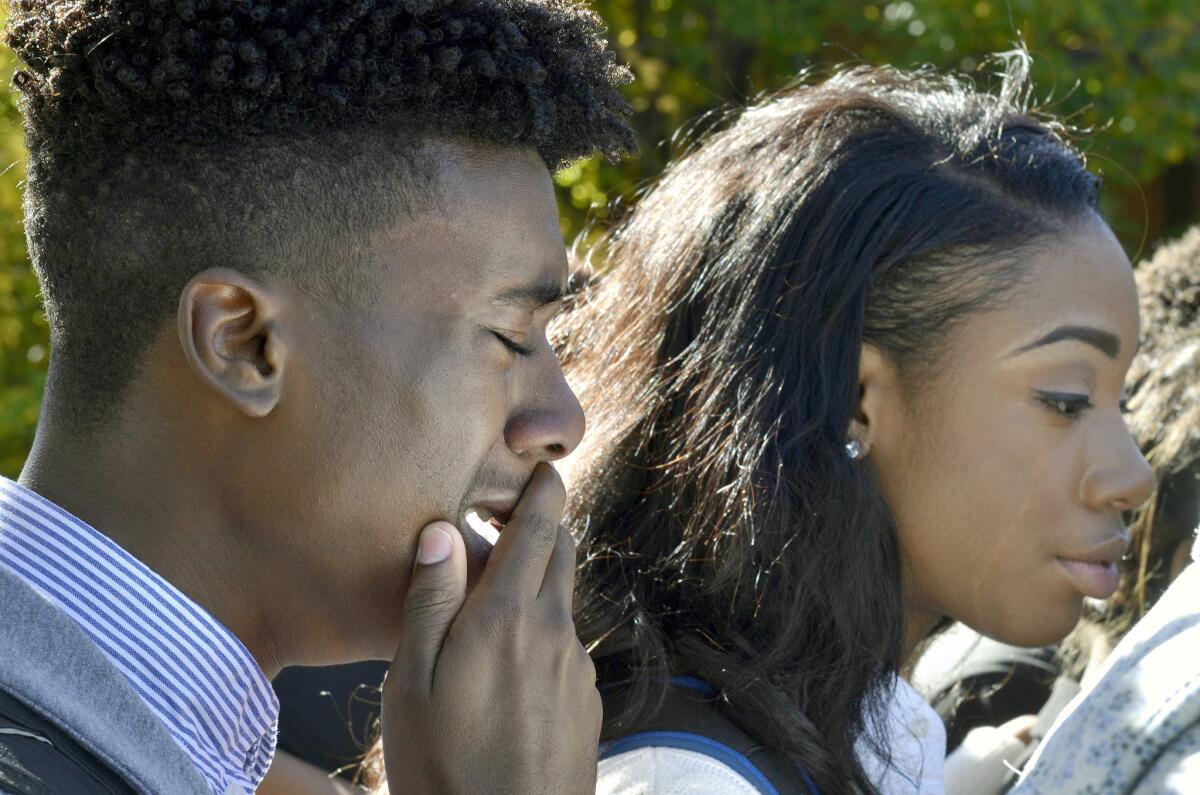Opinion: Would University of Missouri students have needed to go to such extremes if they were Jewish?

Members of the University of Missouri’s Legion of Black Collegians and the Concerned Student 1950 supporters react after an on-campus protest, in Columbia, Mo. on Saturday.
- Share via
One morning, when I was 10 years old, I woke up to find my normally sleepy suburban town covered in swastikas. They were on mailboxes, they were on businesses, they were in front of the home of our local rabbi. The perpetrators, as if to remove even the slightest whiff of ambiguity from their message, scrawled slogans like “Final Solution” and “Hitler’s Children” alongside their work. It was the day before Yom Kippur—the holiest day of the year for Jews.
The message couldn’t have been clearer: me, my family and those like us were not wanted in this town.
Sadly, this wasn’t my first experience with anti-Semitism. It was, however, far and away the most terrifying. This wasn’t mere casual bias. There were people out there, in my community, who hated me, who might want to hurt me, and whom no amount of reason could talk out of these feelings. And they could very well have known where I lived.
I’ve been thinking a lot about this incident as I’ve followed the coverage of the protests at the University of Missouri. I’ve been thinking about it as I’ve read and heard puzzled queries suggesting the ouster of Mizzou President Tim Wolfe wasn’t really necessary. And I’ve especially been thinking about it every time I see lazy (and often malicious) conflations between the protests at Missouri and those at Yale—where, in the minds of many pundits, apparently, the school’s debate over racially charged Halloween costumes occurred in an otherwise racism-free zone.
It’s almost impossible to imagine such a zone in Missouri. Over the past several years black students at Mizzou were repeatedly called racist names to their faces, the grounds of the school’s Black Culture Center were covered with cotton balls, the center was the target of arson threats, a black professor was spat at and called names by a white man flying a confederate flag from his truck, and a dormitory wall was decorated with feces in the shape of a swastika.
What happened at Mizzou was not a matter of mere insensitivity. It was not an intellectual abstraction. These were terrorist acts, meant to silence and intimidate, and they demanded an immediate and forceful response from school officials, police and the community at large.
That didn’t happen. It took a week for school administrators to issue even the simplest of public statements after Mizzou’s student body president was addressed using a racial slur. The perpetrators of the cotton ball incident were charged with littering.
Contrast that with what happened at UC Davis this year when a lone swastika was found painted on a Jewish fraternity house. UC Davis officials issued an immediate condemnation, the local Anti-Defamation League offered a $2,500 reward to find the perpetrator, and Davis police launched a hate crime investigation.
When vandals painted swastikas on the campus of Northwestern University in June, university President Morton Schapiro issued a campuswide email: “These acts are offensive to the entire Northwestern community and will not be tolerated.”
There was no backlash when Jewish groups asked Schapiro to do more to combat anti-Semitism on campus. No paeans to free speech appeared in the media in defense of the swastika, suggesting Jewish students needed to toughen up in the face of bigotry.
Here is what happened in my town in the wake of our swastika spate: Local officials and police condemned the actions and vowed to find those responsible. A nearby college led an anti-racism march in support of the Jewish community. Newspaper columnists expressed their outrage and their demands for justice.
It took only a few days to track the culprits down. They were charged with 26 counts of malicious destruction of property and two counts of civil rights law violations. They faced 10 years in prison, though they eventually received much lighter sentences.
The length of jail time didn’t matter. The entire region had sent them – and me – a message: Acts of hatred and bigotry won’t be tolerated. The fear and alienation I felt was immediately quelled in this wave of support.
See the most-read stories this hour >>
Yet in Missouri it took a student hunger strike and a football protest to achieve a fraction of the support my community was given without question.
“It is disgusting and vile that we find ourselves in the place that we do,” hunger-striking Mizzou grad student Jonathan Butler said in a speech after Wolfe’s resignation.
“When students were crying out for help, our administration left us stranded,” University of Missouri Students Assn. member Brenda Smith-Lezama told PBS’ Gwen Ifill.
Tim Wolfe stepped down, as he should have, because, faced with acts of terrorism committed against his students and faculty, he twiddled his thumbs. In those crucial moments of fear, anger and anxiety, the school’s African American community was not given the support it needed, the support that basic human decency demands.
In all my recent thinking about these events, I don’t have an answer for one important question: Would Wolfe have done so little, and would the media narrative be so mixed, if all the victims were Jewish instead of black?
Follow the Opinion section on Twitter @latimesopinion and Facebook.
MORE FROM OPINION:
Why Ben Carson has no business near the Oval Office
What ordinary Palestinians think about Jews, Israel and violence
If L.A. wants to be a world class city, it needs to stop micromanaging its public space
More to Read
A cure for the common opinion
Get thought-provoking perspectives with our weekly newsletter.
You may occasionally receive promotional content from the Los Angeles Times.










